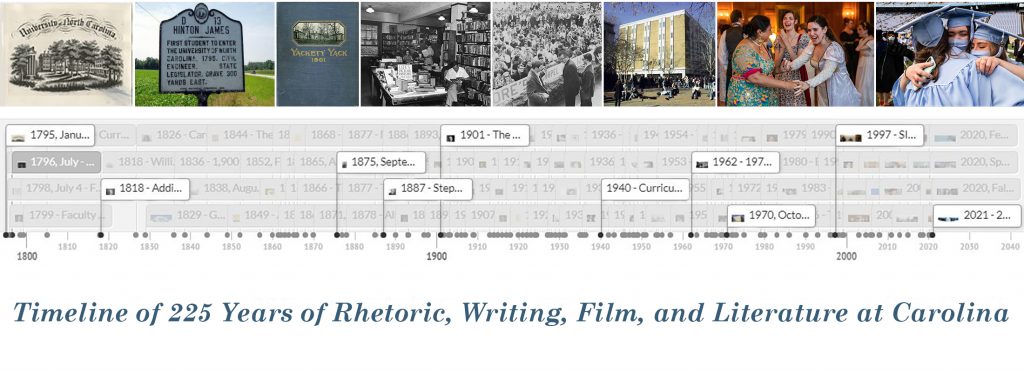For the 225th anniversary of the Department of English and Comparative Literature, the Digital Literacy and Communications Lab worked with faculty, graduate, and undergraduate students of past and present to craft a working timeline that tells the history of the department.
View the timeline here.
This timeline was created by the Digital Literacy and Communications Lab, directed by Dr. Courtney Rivard. Students in the lab, including Garland Reiman, Emily Youree, Paul Blom, Grant Glass and Hannah Montgomery, spent countless hours over a two-year period combing through archives, conducting interviews, and compiling information to create this most complete history of the Department of English and Comparative literature that currently exists.
This work could not have been completed without the help of Dr. Connie Eble and Dr. Erika Lindemann. Dr. Eble provided her wealth of personal knowledge and records as she came to serve as a faculty member in the department in 1971. Dr. Lindemann served as a faculty member in ECL for 30 years. Not only did Dr. Lindemann provide her personal knowledge, but she also shared her research into the history of rhetoric and writing, which includes UNC’s contribution to this history. Additionally, as the former associate dean for Undergraduate Curricula, she created a digital history of the antebellum University, which can be found at “True and Candid Compositions: The Lives and Writings of Antebellum Students at the University of North Carolina.”
The digital infrastructure of this timeline is built with the open-source software provided by Scalar. Grant Glass provided the customized coding to adapt the software to the needs of the project.
To highlight the years of work on this project, below are quotes from several contributors to the timeline about the importance of why and how we present the history of the Department of English and Comparative Literature at UNC-Chapel Hill.
Mary Floyd-Wilson, Mann Distinguished Professor and ECL Department Chair
“The timeline demonstrates the kind of work that we in the English and Comparative Literature department do: we tell complicated human stories, weaving together a range of sources and paying attention to what’s elided. One of those stories is the inspirational and generative work of ECL’s past students and teachers, whose scholarly pursuits repeatedly inspired the formation of new programs and new departments across this University.”
Courtney Rivard, ECL Teaching Associate Professor and Director of the Digital Literacy and Communications Lab
“The DLC has spent the last two years combing through archival material to create a timeline for the study of rhetoric, writing, film and literature at UNC. We have worked hard to think about how this history has been shaped by exclusions as well as how critical openings occurred to bring greater inclusion. As with all archival research, we recognize that there are silences in the archival record because important material was never collected. To that end, we understand the timeline as a living document that will change over time as new stories come to light and welcome those with information about this history to write the DLC lab at dlc_lab@unc.edu.”
Erika Lindemann, ECL Professor Emeritus
“Working on this timeline has strengthened my admiration for the many teachers and students who shaped the discipline known today as English and Comparative Literature. Their discussions and scholarship, their service to and support of one another, and the professional gifts they took away but also left behind—these have all built our department. The timeline suggests that our success lies in remaining student-centered, willing to open new spaces for our teaching and research, and committed to understanding and promoting the literate practices that allow people to flourish in our time.”
Hannah Montgomery, ECL Ph.D. Candidate
“While we are proud of how long the study of literature and writing has been at UNC, we know that there are points in that history we are not and should not be proud of. Instead, we are proud of the progress we have made in that time and of the spirit of innovation and culture of freedom of exploration that will push us to continue to progress. That is the story we are trying to tell, a story of change and of opening up, the innovations at UNC and in the department show a broadening of what it means to study literature and who can do that work.I like to think of this not as a celebration of our past, but of the spirit of the department and the freedom in it to go in a new direction, which has brought us where we are and will help us address the issues of today and bring us into the future.”
Grant Glass, ECL Ph.D. Candidate
“We wanted to convey the rise of digital praxis into our timeline, so rather than create a static timeline or a basic website, we decided to create a dynamic timeline. Using Timeline JS and Scalar to represent our department’s history allows us to represent our history in a non-hierarchical and innovative way. The timeline also serves as a digital humanities project, one that requires deep subject matter expertise, but also an understanding of digital tools and how they might help us represent the past in new ways.”


